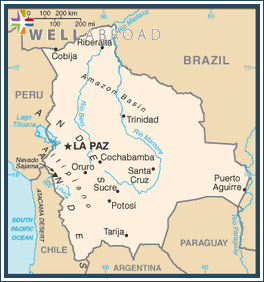|
MOST RECENT ALERTS
There's no recent alert.
|

|
|||||||||||||||
| COUNTRY OVERVIEW | ||||||||||||||||
|---|---|---|---|---|---|---|---|---|---|---|---|---|---|---|---|---|
|
| COUNTRY GENERAL INFORMATION | |||||||
|---|---|---|---|---|---|---|---|
| Language: |
Spanish (official), Quechua (official), Aymara (official) |
||||||
| Currency: | Boliviano (BOB) | ||||||
| Predominant Religions: |
Roman Catholic 95%, Protestant (Evangelical Methodist) 5% |
||||||
| National Holidays: | Independence Day, 6 August (1825) | ||||||
| Economic Status: |
Bolivia is one of the poorest and least developed countries in Latin America. Following a disastrous economic crisis during the early 1980s, reforms spurred private investment, stimulated economic growth, and cut poverty rates in the 1990s. A decline in commodity prices that began in late 2008, a lack of foreign investment in the mining and hydrocarbon sectors, a poor infrastructure, and the suspension of trade benefits with the United States will pose challenges for the Bolivian economy in 2010. |
||||||
| Security: |
Bolivian Armed Forces: Bolivian Army (Ejercito Boliviano), Bolivian Navy (Armada Boliviana; includes marines), Bolivian Air Force (Fuerza Aerea Boliviana, FAB) |
||||||
| US Presence: |
U.S. Embassy in La Paz Fax: (591) 2-216-8111 |
||||||
| Document Requirements: |
To enter and depart Bolivia, you are required to have a US passport valid for at least six months from the date of your proposed entry into Bolivia. |
||||||
| Major Airports: |
Airports: 1,084, Airports with paved runways: 16 La Paz - J F Kennedy International Airport (LPB/SLLP) |
||||||
| Servicing Airlines: |
|
||||||
| Risks and Precautions: |
If you visit the Andes Mountains, ascend gradually to allow time for your body to adjust to the high altitude, which can cause insomnia, headaches, nausea, and altitude sickness. In addition, use sunblock rated at least 15 SPF, because the risk of sunburn is greater at high altitudes. |
||||||
| Mortality Statistics: |
Infant MR total: 50.43 deaths/1,000 live births |
||||||
| Immunization Indicators: |
Required: Yellow fever vaccination requirement for travelers to Bolivia: Required for all travelers >1 year of age. Medical waivers must be translated into Spanish and accompany the International Certificate of Vaccination or Prophylaxis (ICVP). Travelers who do not have a valid ICVP will still be allowed to enter Bolivia if they agree to sign an affidavit exempting the Bolivian state from any liability in the event the traveler gets sick with yellow fever within the Bolivian territory. This last option may cause delays at the point of entry. CDC recommendation: For all travelers >9 months of age traveling to areas east of the Andes Mountains (see Map 4-16). Does not include the cities of La Paz or Sucre. Vaccination should be given 10 days before travel and at 10 year intervals if there is on-going risk. Find an authorized U.S. yellow fever vaccination clinic. |
||||||
| Infectious Disease Concerns: |
Malaria risk in areas below 2,500 meters (8,202 feet) in the following departments: Beni, Chuquisaca, Cochabamba, La Paz, Pando, Santa Cruz, and Tarija. No risk in city of La Paz. |
||||||
| Overall Quality of Medical Services: |
Medical care in large cities is adequate for most purposes but of varying quality. Ambulance services are limited to non-existent. Medical facilities are generally not adequate to handle serious medical conditions. Pharmacies are located throughout Bolivia, and prescription and over the counter medications are widely available. |
||||||
| Providers in Network: |
|
||||||
| Recent Medical Threats/ Concerns/Warnings: |
Dengue, filariasis, leishmaniasis, onchocerciasis, and American trypanosomiasis (Chagas disease) are other diseases carried by insects that also occur in this region. Epidemics of viral encephalitis and dengue fever occur in some countries in this area. Bartonellosis, or Oroya fever (a sand fly-borne disease), occurs in arid river valleys on the western slopes of the Andes up to 3,000 meters (9,842 feet). Louse-borne typhus, a rickettsial infection is often found in mountain areas of Colombia and Peru. Protecting yourself against insect bites (see below) will help to prevent these diseases. |
||||||
| Communications Info: |
Country Calling Code: +591 |
||||||






